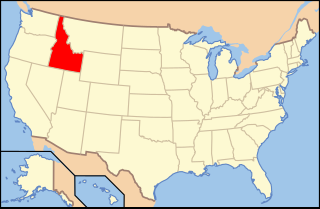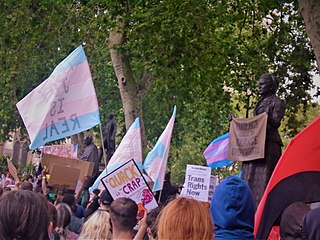| |||||
| Decades: | |||||
|---|---|---|---|---|---|
| See also: | |||||
Events in the year 2017 in Botswana .
| |||||
| Decades: | |||||
|---|---|---|---|---|---|
| See also: | |||||
Events in the year 2017 in Botswana .
A similar case, where a transgender woman sought to change her gender marker to female, was heard in December 2017. The High Court ruled that the Government must recognise her gender identity. [5] She dedicated her victory to "every single trans diverse person in Botswana".

The legal status of transgender people varies greatly around the world. Some countries have enacted laws protecting the rights of transgender individuals, but others have criminalized their gender identity or expression. In many cases, transgender individuals face discrimination in employment, housing, healthcare, and other areas of life.

Lesbian, gay, bisexual, and transgender (LGBT) people in Botswana face legal issues not experienced by non-LGBT citizens. Both female and male same-sex sexual acts have been legal in Botswana since 11 June 2019 after a unanimous ruling by the High Court of Botswana. Despite an appeal by the government, the ruling was upheld by the Botswana Court of Appeal on 29 November 2021.

Lesbian, gay, bisexual, and transgender (LGBT) people in India face legal and social challenges not experienced by non-LGBT people. There are no legal restrictions against gay sex or gay expression within India. Same-sex couples have some limited cohabitation rights, colloquially known as live-in relationships. However, India does not currently provide for common law marriages, same-sex marriage, civil unions, guardianship or issue partnership certificates.

Lesbian, gay, bisexual, and transgender (LGBT) rights in Nepal have expanded in the 21st century, though much of Nepal's advancements on LGBT rights have come from the judiciary and not the legislature. Same-sex sexual acts have been legal in Nepal since 2007 after a ruling by the Supreme Court of Nepal.

Lesbian, gay, bisexual and transgender (LGBT) rights in Tamil Nadu are the most progressive among all states of India. Tamil Nadu was the first state in India to introduce a transgender welfare policy, wherein transgender individuals can access free gender affirmation surgery in government hospitals and various other benefits and rights. The state was also the first to ban forced sex-selective surgeries on intersex infants, and also the first state to include an amendment in its state police guidelines that expects officers to abstain from harassing the LGBTQIA+ community and its members. The state also became the first to ban conversion therapy as well as the first to introduce LGBTQIA+ issues in school curricula.

The transgender rights movement is a movement to promote the legal status of transgender people and to eliminate discrimination and violence against transgender people regarding housing, employment, public accommodations, education, and health care. A major goal of transgender activism is to allow changes to identification documents to conform with a person's current gender identity without the need for gender-affirming surgery or any medical requirements, which is known as gender self-identification. It is part of the broader LGBT rights movements.
In the United States, the rights of transgender people vary considerably by jurisdiction. In recent decades, there has been an expansion of federal, state, and local laws and rulings to protect transgender Americans; however, many rights remain unprotected, and some rights are being eroded. Since 2020, there has been a national movement by conservative/right-wing politicians and organizations to target transgender rights. There has been a steady increase in the number of anti-transgender bills introduced each year, especially in Republican-led states.

Lesbian, gay, bisexual, and transgender (LGBT) rights in the U.S. state of Indiana have been shaped by both state and federal law. These evolved from harsh penalties established early in the state's history to the decriminalization of same-sex activity in 1977 and the legalization of same-sex marriage in 2014. Indiana was subject to an April 2017 federal court ruling that discrimination based on sexual orientation is tantamount to discrimination on account of "sex", as defined by the Civil Rights Act of 1964. The ruling establishes sexual orientation as a protected characteristic in the workplace, forbidding unfair discrimination, although Indiana state statutes do not include sexual orientation or gender identity among its categories of discrimination.

Lesbian, gay, bisexual and transgender (LGBT) people in the U.S. state of Idaho face some legal challenges not experienced by non-LGBT people. Same-sex sexual activity is legal in Idaho, and same-sex marriage has been legal in the state since October 2014. State statutes do not address discrimination based on sexual orientation and gender identity; however, the U.S. Supreme Court's ruling in Bostock v. Clayton County established that employment discrimination against LGBT people is illegal under federal law. A number of cities and counties provide further protections, namely in housing and public accommodations. A 2019 Public Religion Research Institute opinion poll showed that 71% of Idahoans supported anti-discrimination legislation protecting LGBT people, and a 2016 survey by the same pollster found majority support for same-sex marriage.
Accounts of transgender people have been uncertainly identified going back to ancient times in cultures worldwide. The modern terms and meanings of transgender, gender, gender identity, and gender role only emerged in the 1950s and 1960s. As a result, opinions vary on how to categorize historical accounts of gender-variant people and identities.
Transgender rights in Australia have legal protection under federal and state/territory laws, but the requirements for gender recognition vary depending on the jurisdiction. For example, birth certificates, recognised details certificates, and driver licences are regulated by the states and territories, while Medicare and passports are matters for the Commonwealth.
This is a list of notable events in the history of LGBT rights that took place in the year 2017.

Multiple countries legally recognize non-binary or third gender classifications. These classifications are typically based on a person's gender identity. In some countries, such classifications may only be available to intersex people, born with sex characteristics that "do not fit the typical definitions for male or female bodies."

Transgender rights in the United Kingdom have varied significantly over time.

Transgender and travesti rights in Argentina have been lauded by many as some of the world's most progressive. The country "has one of the world's most comprehensive transgender rights laws": its Gender Identity Law, passed in 2012, made Argentina the "only country that allows people to change their gender identities without facing barriers such as hormone therapy, surgery or psychiatric diagnosis that labels them as having an abnormality". In 2015, the World Health Organization cited Argentina as an exemplary country for providing transgender rights. Leading transgender activists include Lohana Berkins, Diana Sacayán, Mariela Muñoz, María Belén Correa, Marlene Wayar, Claudia Pía Baudracco, Susy Shock and Lara Bertolini.
The legal and regulatory history of transgender and transsexual people in the United States begins in the 1960s. Such legislation covers federal, state, municipal, and local levels, as well as military justice. It reflects broader societal attitudes which have shifted significantly over time and have impacted legislative and judicial outcomes.
This is a timeline of notable events in the history of non-heterosexual conforming people of African ancestry, who may identify as LGBTIQGNC, men who have sex with men, or related culturally specific identities. This timeline includes events both in Africa, the Americas and Europe and in the global African diaspora, as the histories are very deeply linked.
Jessica Simpson, commonly known by her former legal name, Jessica Yaniv, is a Canadian transgender activist in British Columbia who is best known for filing at least 15 complaints of discrimination on the basis of gender identity against various beauty salons after they refused to wax her male genitalia. The complaints were filed with the British Columbia Human Rights Tribunal in 2018 and 2019. It was the first major case of alleged transgender discrimination in retail in Canada. In 2019, the Tribunal rejected her complaints and ruled Yaniv had racist motives. In following years, Yaniv has gone on to make additional complaints of discrimination, libel and privacy breach.
Tshepo Ricki Kgositau-Kanzaa, is trans-rights activist from Botswana who lives in South Africa.
Henry Edward Tse is a transgender rights activist based in Hong Kong. He is the founder of Transgender Equality Hong Kong. In February 2023, Tse won a court appeal to remove full sex reassignment surgery as a requirement for changing gender on identification cards.